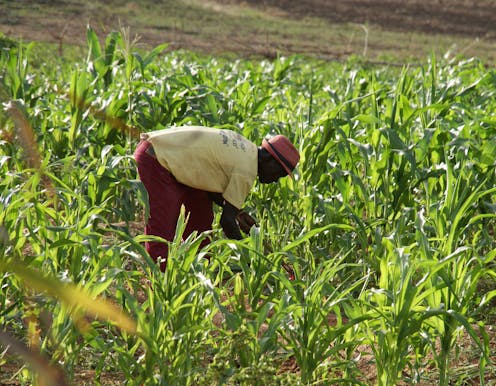What Ghana’s small businesses can teach the world about becoming more sustainable
- Written by Andrea Caputo, Professor of Strategy & Negotiation, University of Lincoln

Small and medium-sized enterprises (SMEs) form the backbone of emerging economies. This is especially true in Ghana, where they represent around 90%[1] of registered businesses and contribute significantly to employment and the economy of the west African nation.
But these businesses face distinct challenges. They must stay competitive in fast-evolving markets while addressing the environmental impacts of their actions. Our recent research[2] investigated how Ghanaian SMEs are achieving this balance.
Ghana is a useful example for SME growth because it has focused on industrialisation coupled with sustainability, at the same time as the government offers initiatives[3] to move the economy from agricultural exports towards manufacturing.
But SMEs in emerging economies like that of Ghana often lack the resources to make radical changes or develop entirely new products from scratch. However, we found that two distinct strategies that allow SMEs to innovate in a sustainable way.
The first of the two strategies is something known as “exploitative search” (meaning that businesses refine what they already have).
A manufacturer might enhance energy efficiency[4] by updating equipment over time or switching to less harmful materials. This could reduce the environmental footprint of the business incrementally. This kind of step-by-step innovation helps SMEs meet environmental standards without the need for large investment in technology.
For example, SMEs in Ghana’s textiles industry have adopted energy-efficient dyeing technologies and machinery. This has allowed them to reduce waste and energy consumption while maintaining the quality of their product.
Our study highlights how this approach offers SMEs a route to sustainable growth. This is especially true in fast-moving markets where they face frequent regulatory changes and shifting consumer preferences. By making the most of their resources, Ghanaian SMEs can remain competitive while moving towards more sustainable practices.
The second strategy – something known as “exploratory search” – encourages businesses to move beyond their normal processes. This could be venturing into new markets or adopting advanced technologies. It can be more challenging and is often costlier, but it positions SMEs to lead in sectors where eco-friendly products are in demand.
For example, some Ghanaian SMEs in the packaging sector have experimented with bioplastics from plant-based starch[5] (from the cassava tuber). These efforts have sped up the development of biodegradable packaging and reduced reliance on oil-based plastics.
By prioritising forward-looking ideas, SMEs that follow this second strategy can stand out in increasingly eco-conscious markets, gaining both a competitive advantage and a reputation for sustainability.
Our findings show that the two strategies are not mutually exclusive. SMEs adopting a balanced approach – integrating both exploitative and exploratory searches – are best positioned to innovate sustainably. This allows them to make steady improvements while staying open to innovations that could transform their business.
The challenges of SMEs in Ghana and other developing countries differ in some ways from those in more advanced economies. But the lessons here are remarkably relevant. While Ghanaian SMEs operate within a dynamic landscape with limited resources, SMEs in wealthier countries also face pressures to become more sustainable, often while competing with much larger firms.
These SMEs, particularly those in sectors where sustainability is a growing priority, can benefit from similar approaches to balance business growth with environmental responsibility.
In stable markets, the first strategy (exploitative search) is especially relevant for SMEs looking to reduce waste and enhance efficiency without high costs. Businesses in richer countries can keep pace with environmental regulations and consumer expectations without needing radical transformations by focusing on incremental improvements.
This could be things such as cutting down on energy use or making their supply chains more efficient. This approach allows SMEs to achieve sustainability goals in a way that is practical and affordable.
For SMEs in wealthier countries that operate in fast-changing sectors such as green technology, the second strategy (exploratory search) can lead to to bold advances. This strategy enables businesses to explore new materials, adopt cutting-edge solutions and develop products that meet the demands of environmentally conscious consumers.
For instance, a small firm producing packaging could incorporate greener materials or use digital tools to track and reduce carbon emissions. By embracing exploratory search, these SMEs can gain an edge in eco-friendly practices and position themselves as leaders in sustainability.
Our research on Ghana’s SMEs underscores that innovation and environmental responsibility are not only possible but essential for sustainable growth. This is true even for smaller businesses. By combining these strategies, companies are creating practical solutions to environmental challenges while remaining competitive. This framework benefits Ghanaian SMEs and provides a roadmap for small businesses globally.
The insights from Ghana’s SMEs are particularly timely as more countries, including those with developed economies, focus on the need for sustainable business practices. SMEs can adapt these strategies to their local contexts, proving that being both green and profitable are not mutually exclusive.
The experience of Ghana’s SMEs demonstrates that even with limited resources and under challenging circumstances, small businesses can drive significant change. These companies are staying adaptable and competitive, while advancing their environmental performance.
Whether in Africa or elsewhere, SMEs have a critical role to play in driving sustainable change. By embracing strategies that prioritise both economic strength and environmental impact, small businesses can be a force for good, helping to build a more sustainable and resilient global economy.
References
- ^ 90% (www.statista.com)
- ^ recent research (www.tandfonline.com)
- ^ initiatives (www.trade.gov)
- ^ energy efficiency (www.globalefficiencyintel.com)
- ^ plant-based starch (ghanascience.gov.gh)
- ^ Joerg Boethling/Alamy Stock Photo (www.alamy.com)







